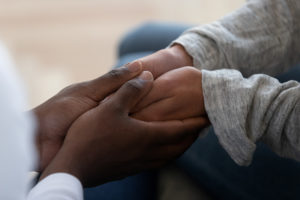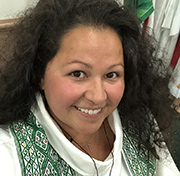by Jen Collins
What’s your word? Mine is OVERWHELMED.
Comfort, O comfort my people, says your God. (Isaiah 40:1)
As I spend time with people in various communities the number one word that I’ve heard over these last couple of months is “OVERWHELMED.” I imagine people everywhere are striving to navigate all the ways we want transformation from the pandemic and beyond. We’ve wanted to endure a world that feels more connected, safer and not as busy. I don’t know if we have found it.
Marrian-Webster Dictionary defines Overwhelmed (Adj.) as “completely overcome or overpowered by thought or feeling.”
Welcome to Advent–a season that intends for us to find solace and calm. A time for awaiting the celebration of Jesus’ birth. However, in my experience, it has been anything but silent nights.
As I listen to seminary students, pastoral and organizational leaders, and everyday folks in grocery stores, mechanic shops, assembly lines, and postal services–people are feeling overwhelmed.
I can recount those moments when it truly feels like we are drowning like we are trying and trying to get out of the pits we are in only to have more heaped upon us. I can just feel the tension in the space between my shoulder blades pulling tighter and tighter, the aches in my temples and the desire to crawl under the sheets into the darkness. I also have experienced the nauseated feeling that reminded me of how I forgot to care for myself by not eating or sleeping enough.
Why do we do it?
Why do we do this to ourselves? Why do we allow these afflictions to happen to one another? This is certainly not good. Not for me and not for those I am to care for.
Through practice in therapy, spiritual direction, and a small group of younger women leaders, I have been able to understand that “Self-care is community care.” I often cling to this wisdom, especially as it is something I have learned during these pandemic times. I do not want to lose this guiding wisdom that brings me comfort amidst anxiety, busyness and overwhelming moments.
Learning to calm
One technique that I learned from the book, “My Grandmother’s Hands: Racialized Trauma and the Pathway to Mending Our Hearts and Bodies,” by Resmaa Menakem (Central Recovery Press) involves releasing trauma from the body.
One body-based meditation exercise called, “The Body Scan” helps to lessen feelings of being overwhelmed in the body. The practice involves sitting down and focusing on what your body reveals about emotions and interactions with others–its about paying attention and listening to your body.
We have millions of interactions daily and our bodies speak to us–we just might not be listening. We must remember that we are embodied beings who live not just with our spirit and mind but with our bodies as well.
I have found “The Body Scan” practice to help build a capacity for awareness, understanding, and compassion for one another. Over time, I believe we can learn to tell when we are open or closed off from ourselves and each other. This can be a healing tool, as we encounter overwhelming things. This takes time to develop, and lean into the world of being human together–of being beloved together.
 “Comfort, O comfort my people, says your God. Speak tenderly to Jerusalem, and cry to her that she has served her term, that her penalty is paid, that she has received from the Lord’s hand double for all her sins. A voice cries out: In the wilderness prepare the way of the Lord, make straight in the desert a highway for our God. Every valley shall be lifted, and every mountain and hill be made low; the uneven ground shall become level, and the rough places a plain. Then the glory of the Lord shall be revealed, and all people shall see it together, for the mouth of the Lord has spoken.” (Isaiah 40:1-5)
“Comfort, O comfort my people, says your God. Speak tenderly to Jerusalem, and cry to her that she has served her term, that her penalty is paid, that she has received from the Lord’s hand double for all her sins. A voice cries out: In the wilderness prepare the way of the Lord, make straight in the desert a highway for our God. Every valley shall be lifted, and every mountain and hill be made low; the uneven ground shall become level, and the rough places a plain. Then the glory of the Lord shall be revealed, and all people shall see it together, for the mouth of the Lord has spoken.” (Isaiah 40:1-5)
As the writer of Isaiah begins with this word: COMFORT. The comfort the Prophet shares is the reassurance that God does not leave God’s people. God is with us. Although, we live in a world where difficult things happen every day, where we carry the word OVERWHELMED all too often. Isaiah reminds us that we serve a God who brings COMFORT, a God who desires for us to care for ourselves and one another.
Closing prayer:
God hear our prayer, When we are overwhelmed help, us pause, breathe and reflect. When it feels too much to carry, may we lean more on you. When darkness seems to have blurred our path, may your light guide our next step. God, we are so grateful to know you never leave and we are not alone. Bring us peace. Bring us hope. Amen.
Discussion questions:
1. Can you think of a memory, a time someone extended care for you? What did they do and how did it make you feel?
2. Think about a time you needed help but didn’t ask for it. What do you wish you could have changed about that experience?
3. How do you care for yourself? Do you reach out for help and support to heal (mentally, physically, and spiritually)?
4. What type of practices help you find comfort and peace? (i.e. The Body Scan meditation)
 Jen Collins (she/ her) serves as an ELCA Pastor of Redeemer Lutheran Church in North Minneapolis within the Twin Cities area. She has been a Minnesota resident for the past 12 years, living with her spouse, two kiddos and dog, Wembley. Having grown up in the southwest in Albuquerque, New Mexico, she carries her Latin heritage and love of Green Chiles with her. Jen has served as a Pastor for 7.5 years in the ELCA and finds it a core tenet of her ministry to work with a racial equity lens, helping people discover their human potential as we strive for the common good because God created us to do good work that empowers, inspires and transforms.
Jen Collins (she/ her) serves as an ELCA Pastor of Redeemer Lutheran Church in North Minneapolis within the Twin Cities area. She has been a Minnesota resident for the past 12 years, living with her spouse, two kiddos and dog, Wembley. Having grown up in the southwest in Albuquerque, New Mexico, she carries her Latin heritage and love of Green Chiles with her. Jen has served as a Pastor for 7.5 years in the ELCA and finds it a core tenet of her ministry to work with a racial equity lens, helping people discover their human potential as we strive for the common good because God created us to do good work that empowers, inspires and transforms.
You can read the other article written The Rev. Jen Collins in this issue here.

